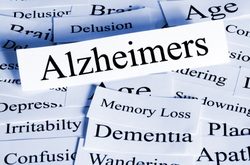"There are four kinds of people in this world: those who have been caregivers, those who currently are caregivers, those who will be caregivers, and those who will need caregivers."  No matter which of the above four categories outlined by former First Lady Rosalynn Carter you may fall into, there is little doubt that your life has been affected by Alzheimer's -- either through a family member, friend or spouse. I won't bombard you with statistics, since they are all over the media airwaves, thankfully so! But I want to point out the there are over 65 million family caregivers in the US alone, mostly women, struggling along as the unsung heroes or sheroes, as the case may be, who deal with this disease or others, daily. I want to let you know that they need your help. Yes, I'm talking to YOU! This is not a disease which will allow cheering from the sidelines. You're going to have to get down and dirty, and maybe take a few hard knocks for the team and almost definitely get out of your comfort zone. If you know anyone who is dealing with Alzheimer's, for heaven's sake, help them out! Here are some things you can do: 1. Give them a huge hug and a warm, sincere "thank you" for their love and care. Let them know you acknowledge how tough it can be. It will make both of you feel better. 2. Offer practical help: a couple hours of respite care so they can go to a movie or shopping or take a nap. Do their laundry at your house and deliver it clean and folded. Take their children out for an afternoon of fun at the park or zoo to give those "sandwiched" between elder care and child care a break on one end of the caregiving spectrum. Find information about resources available in your local area for support, respite, help and give them to the caregiver with encouragement to help them follow through. 3. Take a walk to end Alzheimer's on Saturday, October 19, when the Alzheimer's Association is sponsoring a national fund-raising event. Click on the Alzheimer's Association link above to sign up. Get your company involved in matching donations raised (if you work for a company so inclined). 4. Help start a Memory Cafe in your community. Here's a "Toolkit" guide for this very worthwhile project and more information about how successful they are and how easy it is to bring better quality of life to those with dementia. There are currently about 80 Memory Cafes around the US, mostly grassroots local efforts, and so very helpful to caregivers and those with dementia. The concept is really taking off in the UK, with excellent support from the government. Here, unfortunately, we have to do it ourselves. 5. Be an advocate for creating dementia-friendly communities, so that caregivers can take their loved ones out to a restaurant, shop, church, or other public event without feeling the terrible stigma that tends to pervade uninformed environments. It isn't that people aren't willing to be dementia-friendly. They simply don't know how. Educate yourself, then educate others. See the excellent resource "Aging, Dementia, and the Faith Community: Continuing the Journey of Friendship" by John T. McFadden, M.Div., Chaplain at Appleton Health Care Center in Appleton, WI) 6. Practice the Mosquito Principle: "If you think you're too small to be effective, you have never been in bed with a mosquito." So, go ahead and be annoying to the decision-makers who can help to fund the end of Alzheimer's. Bother everyone you can think of and be very persistent in your efforts to help caregivers at the end of their rope, dealing with Alzheimer's. You CAN make a difference. Practice being mosquito-like. It can actually be fun, once you get the buzz, er, whine of it! 7. Introduce folks to this website which has a depth of resources, links, tips, advice and sanity-saving humor to help caregivers maintain their own well-being. There are helpful ideas about using music, meditation, aromatherapy, self-care, inspiring books, personalized playlists on iPods with www.musicandmemory.org, and so much more at www.caregiverwellness.biz. 8. Lastly, practice outrageous acts of kindness and caring for the people you love, and maybe for strangers, too. Use the Pay it Forward concept. Reach out and offer your support in big and small ways. Be vocal, be an activist, be a pain in the patooti, but be involved. If we are not, who will be? 10/3/2012 Memory Cafes & Overnight Respite Care I've just been reading about these two concepts for Alzheimer's care, which frankly could completely change the face of caregiving for families dealing with this difficult disease. Given that one of the biggest problems for family caregivers caring for their loved one at home is isolation/depression, the chance to be with a group of other caregivers (and care receivers) in an enjoyable social setting provided by the Memory Cafe is a perfect boost to mental and emotional health. Even respite care, though very necessary, doesn't provide the same kind of supportive, warm, interactive environment in which to simply exchange conversation, ideas and enjoy the company of others who completely understand the challenges of the Alzheimer's journey. It benefits both the caregiver and receiver to have this type of socially stimulating environment. It is not a "support group" for caregivers, since the aim is not to provide education, problem solving, or information, but rather just to have fun! The concept for Memory Cafes is really beginning to catch on in England, and is now being actively advocated here in the US as well. The focus is on positive reinforcement among peers, laughter, food and simple pleasure in the company of others who are going through the same journey -- without any stigma attached. After all, other caregivers will be much more understanding of behaviors that might cause embarassment in a public setting. According to John T. McFadden, in an article written for the Alzheimer's Reading Room: A Reminder: Why We Need Memory Cafes, "Memory Cafes are, first and foremost, a setting in which persons with memory loss can share fun and laughter with their care partners and friends in a setting free from awkwardness and stigma." Speaking as a former caregiver, I think this is a truly wonderful idea, one whose time has come! Mr. McFadden has written a newly released book to champion the cause, titled, Aging Together: Dementia, Friendship, and Flourishing Communities. He and his wife are planning to visit existing Memory Cafes in England in order to refine a model for use in America. This is a concept we should most definitely support. It just makes sense to tap this important resource we have in each other -- our sense of friendship and community, which can be an invaluable help to those on the front lines of Alzheimer's. The second concept, which is new to me, but has been practiced at the Hebrew Home at Riverdale in New York for the past 10 years, is overnight care for dementia patients to allow caregivers a good night's rest at home. This innovative concept makes 24-hour use of the nursing home facility, to provide day care from 8:30am to 4 pm and overnight care from 7 pm to 7 am. The program creates a sort of party atmosphere for the participants, with music, marimbas, and dancing as well as singalongs, crafts, and therapy sessions that last till dawn. There is also provision made for those whose Alzheimer's may be more advanced, which includes soothing sounds, aromatherapy, massage and touch therapy. If you would like to read more about this, here's a link to an Associated Press article appearing in the Wall Street Journal, updated October 1, 2012, titled: Overnight dementia 'camp' allows caregivers rest. Because so many Alzheimer's patients are very wakeful and sometimes agitated at night (called Sundowning), it creates major problems for families when their sleep is disrupted night after night by this behavior. Again, from a personal experience perspective, this was the single most insurmountable problem for my family -- sleep deprivation for months on end. It errodes a person's health, sanity, and makes the demands of caregiving impossible to continue. It is a major complaint of Alzheimer's caregivers and one of the main reasons for institutionalizing their loved one. It doesn't have to be if there are more programs for overnight respite care developed around the country. It really makes perfect sense to use facilities around the clock (with different shifts of staff, obviously), so that families can rest and resume their care duties after a good night's sleep. I would love to hear your feedback on these two concepts and any personal stories you'd like to share about how your family is affected by these challenges of caregiving. Feel free to comment below. |
About Karen
Karen is a compassionate, enthusiastic student of life, who cared for her mother for 17 years. She brings her insights, compassion, experience and desire to share knowledge and healing to this ongoing conversation with others on the caregiving path. If you are caring for a parent, spouse, friend or other loved one this site offers sanity-saving tips, open-hearted self-care ideas, and an open forum for discussion, connection and sharing resources for the journey. Archives
October 2021
CategoriesAll Acceptance Aging Together Alan Cohen Alive Inside Movie Alzheimer's Alzheimer's Prevention A Mind Of Your Own Anxiety Aromatherapy Audio Therapy For PTSD Austin Air Hepa Filter Autism Back Care Video Beginner's Mind Being Present Blessing For Caregivers Books Brain Insulin Butterfly Story Calm Calm.com App Care For Veterans Caregiver Advocate Caregiver Coalition Caregiver Comfort Kit Caregiver Guilt Caregiver Retreat Caregiver's Serenity Prayer Caregiver Stress Caregiver Support Care Giving Caregiving Vulnerability Care In Hospital Caterpillar Into Butterflies Chamomile Tea Cindy Laverty Comedian Computers & Exercise Crisis Dan Cohen Deepak Chopra Delirium Depression Diabetes Disaster Preparedness Distractions Dr. Dharma Singh Khalsa Dr. Oliver Sacks Eden Alternative Eldershire Elizabeth Dole Foundation Emergency Planning Emergency Preparation Emerson End Of Caregiving Enough Already Escapism Essential Oils Food Safety Forgiveness Funny Stories Gaiam.com Gail Sheehy Gift Of Alzheimer Gift Of Healing Presence GMO Food Green House Project Gregory Fricchione Md Grief Guilt Happy Light Healing Holding Hands Home As Sanctuary Hope Hospital Caregiving Hospital Stay Humor Inspirational Reading Ipods For Nursing Homes Isolation Jacksonville James E. Miller John Denver Johns Hopkins Study John T. McFadden Jon Kabat-Zinn Kelly Brogan Kirtan Kriya Meditation Lao Tzu Laugh Laughter Lavender Loneliness Loss Of Purpose Love Love In The Nursing Home Maya Angelou Mayo Clinic Mayo Clinic Alzheimer's Blog MD Meditation Meditation Garden Melatonin Memory Memory Cafe Military Caregiver Mindfulness Meditation Mr. Bean Music Music & Alzheimer Music And Memory Neurological Research Noise Pollution Operation Family Caregiver Opportunity Overnight Respite Care Pandemic Passages In Caregiving Patience Paul Coelho Peace Post-traumatic Stress Disorder Power Of Love Prayer PTSD Quality Of Sleep Radical Contentment Relaxation Releasing Problems Renewal Research Respite Rewind Rodney Yee Rosalynn Carter Rosalynn Carter Institute For Caregiving Rowan Atkinson Sanctuary Sanity Self Care Serenity Silence Sleep Slowing Time Solutions Soothing Music Stress Stress Relief Sun Sunshine Support For Caregivers Tai Chi Thanksgiving The Care Company The Kiss Time Traumatic Brain Injury Travel With Alzheimer's Person Treat VA Caregivers Valentine's Day Verilux Veteran Farms Veterans Veteran Suicide Vitamin D Wayne W. Dyer Wellness Wendell Berry White Noise William H. Thomas Worry Yoga Yoga Video |

